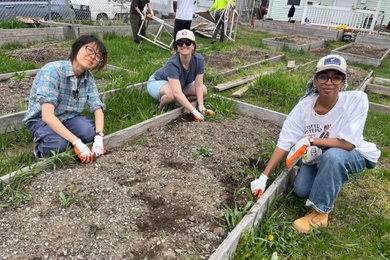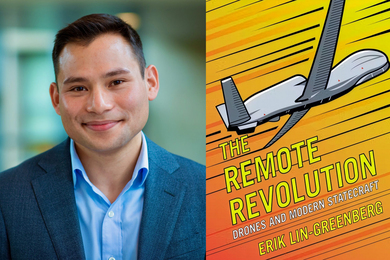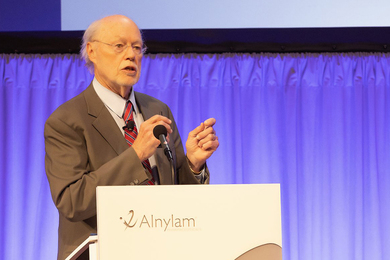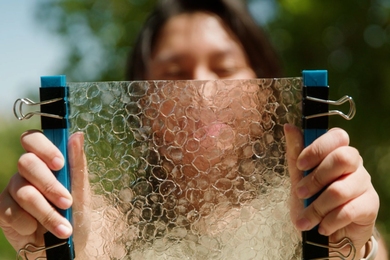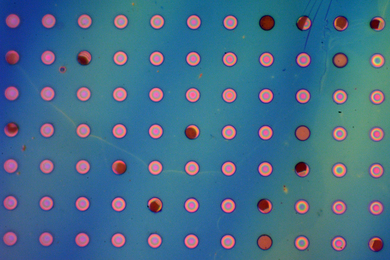As concerns about water scarcity, a growing world population, and mounting pressures from climate change put further strain on our global water resources, so does the MIT community strive harder than ever to promote the importance of water innovation.
On April 6, the student-led MIT Water Club hosted the final pitches for its inaugural Water Innovation Prize — an opportunity for MIT students to work in tandem with real-world investment, corporate, and/or entrepreneurial mentors on ventures with application in monitoring and analytics, oil and gas, recycling and reuse, and drinking water and sanitation.
“Water is a critical resource of scale, and how we deal with it will define human progress in the decades to come,” said Professor Markus Buehler, head of the Department of Civil and Environmental Engineering (CEE). “This student initiative applies multiple dimensions ranging from science, engineering, and policy to entrepreneurship, the nexus of which holds the key to solving the problem.”
Over the course of four months, seven MIT-based teams prepared their enterprises for the chance to win $20,000 in innovation grants, sponsored by PepsiCo. The celebratory showcase attracted more than 200 students, faculty, and business leaders, all of whom attended to listen to the water solutions devised by the MIT teams.
According to Voeller, the Water Club and this new competition both demonstrate a truly diverse cross-section across all departments at MIT. The prize was created to establish a platform for collaboration as well as commercialization of water technologies and processes across a range of domestic and global sectors.
“There is a growing community at MIT committed to take the next step in water innovation. Water management and treatment are critical to our communities, businesses, and environment,” said the competition’s founding director Liz Voeller, a graduate student in the Sloan School of Management. “Here at MIT, we are tackling these issues in the lab, in the classroom, as student-led side projects, and ultimately, as alumni. The prize encourages the MIT community to bring these solutions to the market in a feasible, scalable way that has real impact.” The prize was co-sponsored by CEE, a department in which the study of global water challenges is highly relevant.
The event was organized into three segments: project pitches from the seven teams, a keynote presentation from Prakash Govindan, MIT alumnus and chief technical officer of Gradiant Corporation, and the announcement of the winners. Each of the teams was allotted five minutes to pitch their final projects to the panel of judges, followed by a five-minute question-and-answer period.
At the conclusion of the event, the judges — Judy Chang, principal of The Brattle Group; Cynthia Fisher, founder and managing director of WaterRev; Nathan Hancock, senior director of Oasys Water; Professor John Lienhard, director of the Abdul Latif Jameel World Water and Food Security Lab; and Arun Sathyagal, senior principal engineer at PepsiCo — deliberated privately for 25 minutes and returned with their three winning picks.
The first prize, a $10,000 innovation grant, was awarded to team “WellDone,” a group of three that developed a remote monitoring technology that improves visibility and accountability of rural water infrastructure. WellDone International executives Austin McGee and Tim Burke work with Ben Armstrong, MIT political science graduate student, to bring impactful data to resource-constrained communities for improved critical infrastructure.
In second place, and the winner of $7,000, was the team “ED4India.” Led by Kishor Nayar, graduate student in mechanical engineering, this project offers a more effective solution for drinking water in urban India. Their venture looks to provide high-efficiency electrodialysis for in-home desalination of drinking water.
The third prize of $3,000 was claimed by team “AquaFresco,” comprised of Chris Lai, graduate student in chemical engineering; Alina Rwei, graduate in materials science; and Sasha Huang, materials science PhD candidate. Their innovation provides a next-generation laundry technology that regenerates 95 percent wastewater.
“The scale of interest and support from the MIT and surrounding water community for this first year was fantastic, even better than expected,” said Voeller. “We hope this paves the way for future teams and ventures.”
The MIT Water Innovation Prize began in the fall semester with an "Idea Pitch and Generator Dinner," initiated through seed funding from CEE. Over 130 students from 12 MIT departments attended the event to identify projects, meet with potential mentors, and connect with team members in preparation for the spring competition.
“To support the MIT community developing their understanding of global water challenges, to act as a hub for interaction among likeminded people, and to learn about current, cutting-edge research in the water sector,” said MIT Water Club co-president and CEE graduate student Neha Mehta. “That’s the mission of the MIT Water Club and Water Innovation Prize.”








